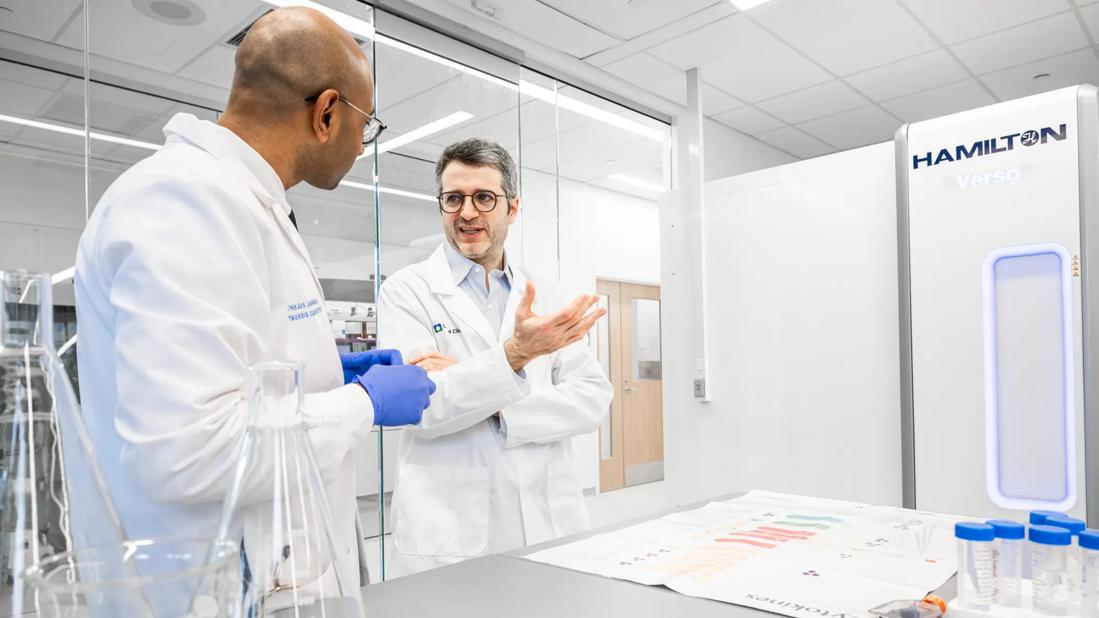Poor response may be due to different tumor biology

Image content: This image is available to view online.
View image online (https://assets.clevelandclinic.org/transform/cc94f3a4-1535-4c21-963c-f4fdb6ce0f32/CNR_4073508_10-19-23_127_MLC-jpg)
Dr. Liska speaking with researcher
Neoadjuvant therapy is less effective in rectal cancer patients with inflammatory bowel disease (IBD) than in patients with sporadic rectal cancer, but it is still beneficial. That is the major finding of the largest study to date that compared outcomes in the two groups; it was presented at the Digestive Disease Week 2025 Annual Meeting.
Advertisement
Cleveland Clinic is a non-profit academic medical center. Advertising on our site helps support our mission. We do not endorse non-Cleveland Clinic products or services. Policy
In recent years, total neoadjuvant therapy (TNT) has become the standard of care for locally advanced rectal cancer (LARC) because it is associated with better outcomes. TNT is an intensified neoadjuvant therapy that always combines radiotherapy and chemotherapy. Historically, IBD, a risk factor for rectal cancer, was a relative contraindication to radiotherapy (RT) because it can cause increased toxicity such as exacerbated diarrhea and rectal bleeding. But as neoadjuvant therapy showed compelling results in sporadic LARC patients, including pathologic complete response, it became the standard of care for all LARC patients.
“We lacked data on how well neoadjuvant therapy works in IBD patients when compared to sporadic patients. We wanted to determine whether IBD patients experience similar benefits from neoadjuvant therapy despite the potential for increased toxicity, ” says David Liska, MD, study co-author and chair of the Department of Colorectal Surgery at Cleveland Clinic.
Study participants -- 92 IBD-LARC patients and 92 matched sporadic LARC patients -- were selected from the Clinic’s institutional registry. All received some form of neoadjuvant treatment: neoadjuvant chemoradiotherapy (CRT), short-course radiotherapy (scRT) or total neoadjuvant therapy (TNT). The primary outcome evaluated was pathological treatment response; other outcomes included recurrence-free survival (RFS) and overall survival (OS).
No differences were found between the two groups in nodal involvement (=0.66) or clinical stage at diagnosis (p=0.75); most tumors were stage III. A baseline ECOG performance of ≥1 was more common in the IBD-LARC group (53.7% vs. 34.1%).
Advertisement
Poorly differentiated adenocarcinoma was more frequent in the IBD-LARC group (32.7% vs. 7.4%). Surgical treatment was inherently different with total proctocolectomy more common in the IBD-LARC group while low anterior resection was more common in the sporadic LARC group.
Pathologic complete response (TRG 0) was significantly less common following any neoadjuvant treatment in the IBD group (6.8% vs.22.6%; p = 0.02). However, only 10% of patients had a poor response to neoadjuvant therapy (AJCC TRG 3).
After a median follow-up of 37 months in the IBD group and 47 months in the sporadic group, the recurrence rates were higher in the IBD group than the sporadic group (37% vs. 22.8%) and they tended to have decreased 5-year RFS (HR=0.58, 95% CI 0.33–1.02, p=0.06). Five-year OS was not significantly different (HR=0.73, 95% CI 0.45–1.17, p=0.19.)
Although IBD patients did not respond as well as sporadic patients, “it is encouraging that we were able to successfully treat these patients with neoadjuvant therapy. Most were able to complete the treatment with most patients having at least a partial response to therapy. It’s a big step forward to have a large data set that shows the outcomes of IBD patients treated with neoadjuvant therapy,” says Dr. Liska.
The tumor biology of IBD-LARC may account for the less robust treatment response. When IBD is present, cancer develops through different molecular pathways when compared to sporadic colorectal cancer. This may explain why the cancer is more commonly poorly differentiated and less responsive to treatment. “It is possible that IBD tumors are inherently more resistant to therapy,” says Dr. Liska.
Advertisement
These results suggest the need for novel more effective personalized neoadjuvant therapies for IBD patients. “If we could find neoadjuvant therapies that would improve responses, we would likely have improved outcomes with less recurrences and better survival,” says Dr. Liska.
In the meantime, this significant new data will help in counseling patients and setting expectations about treatment response. “The take-home message is that IBD patients can be treated with total neoadjuvant therapy, like sporadic cancers, where outcomes are better. We will continue to provide personalized multidisciplinary care that combines neoadjuvant therapy and surgery to optimize outcomes and maximize quality of life,” says Dr. Liska.
Advertisement
Advertisement
Study sheds light on distant metastasis rates between upfront surgery and Watch & Wait strategies
Tips on how to recognize the condition and budesonide treatment guidance
Findings could help promote organ preservation
Input from specialists and other healthcare providers is important when discussing quality-of-life improvement options
The retrospective study also identified predictors for which patients would likely achieve a complete response from TNT
Key points highlight the critical role of surveillance, as well as opportunities for further advancement in genetic counseling
Benefits of neoadjuvant immunotherapy reflect emerging standard of care
Multidisciplinary framework ensures safe weight loss, prevents sarcopenia and enhances adherence